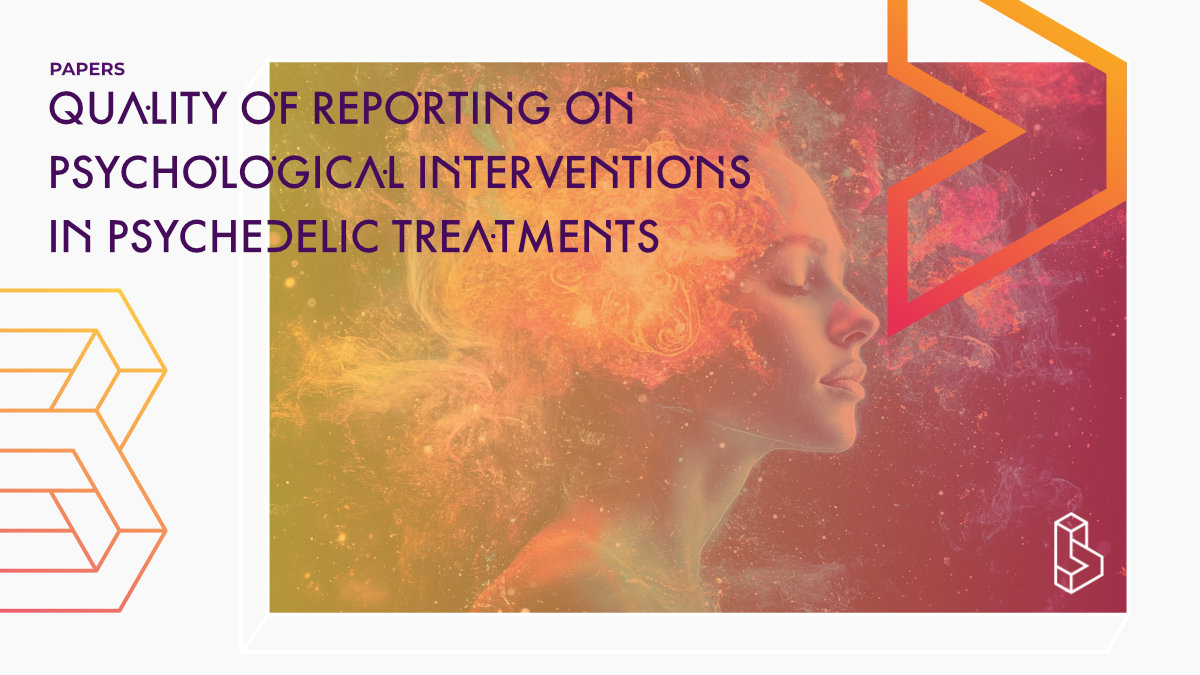This systematic review (2024; s=45) on psychedelic-assisted psychotherapy for mental disorders finds that psychological interventions are reported with low completeness and high heterogeneity. It also finds that MDMA studies are more homogeneous, with greater procedural detail.
Abstract of Quality of reporting on psychological interventions in psychedelic treatments
“Although studies of psychedelic-assisted psychotherapy are accumulating, there is no consensus regarding best practice of the psychotherapeutic component. In this systematic review, we summarised the quality of reporting on psychological interventions in research about psychedelic treatments. The design followed PRISMA guidelines and was preregistered in PROSPERO (CRD42022319221). We searched MEDLINE, PsycINFO, and Embase for original studies on psychedelic-assisted psychotherapy and included 45 studies assessing psilocybin, 3,4-methylenedioxymethamphetamine (MDMA), lysergic acid diethylamide (known as LSD), or ayahuasca, for the treatment of mental disorders. Psychological interventions were done heterogeneously across studies, and completeness of information reported about these interventions was mostly low, according to an adaptation of the Template for Intervention Description and Replication checklist. In studies including MDMA, psychotherapy was more homogeneous and more procedural details were provided. Improved reporting on psychological interventions of psychedelic treatments will support replicability, generalisability, and accurate interpretation of research, while enhancing feasibility and safety of future clinical research and real-world implementation of treatments.“
Authors: Carolina Seybert, Nina Schimmers, Lucio Silva, Joost J. Breeksema, Jolien Veraart, Bárbara S. Bessa, Dora d’Orsi, Robert A. Schoevers & Albino J. Oliveira-Maia
Summary of Quality of reporting on psychological interventions in psychedelic treatments
Psychedelic-assisted psychotherapy has re-emerged as a promising approach to address mental health disorders resistant to traditional treatments. Substances like psilocybin, lysergic acid diethylamide (LSD), ayahuasca, and MDMA have shown potential in treating conditions such as major depressive disorder, treatment-resistant depression, post-traumatic stress disorder (PTSD), and addiction. Despite the promising outcomes, the therapeutic component of these treatments lacks standardisation, leading to questions about the relative contributions of the substance and the psychological support to the observed effects.
The authors highlight that the effectiveness of psychotherapy often depends on the competence of therapists and the integrity of treatment protocols. However, clinical trials on psychedelic-assisted psychotherapy frequently fail to provide comprehensive descriptions of the psychological interventions, raising concerns about replicability and patient safety. This systematic review examines the quality of reporting on psychological interventions within this field, aiming to enhance replicability and guide the development of best practices.
Methods
Find this paper
Quality of reporting on psychological interventions in psychedelic treatments: a systematic review
https://doi.org/10.1016/S2215-0366(24)00333-X
Paywall | Google Scholar | Backup | 🕊
Cite this paper (APA)
Seybert, C., Schimmers, N., Silva, L., Breeksema, J. J., Veraart, J., Bessa, B. S., ... & Oliveira-Maia, A. J. (2024). Quality of reporting on psychological interventions in psychedelic treatments: a systematic review. The Lancet Psychiatry.

